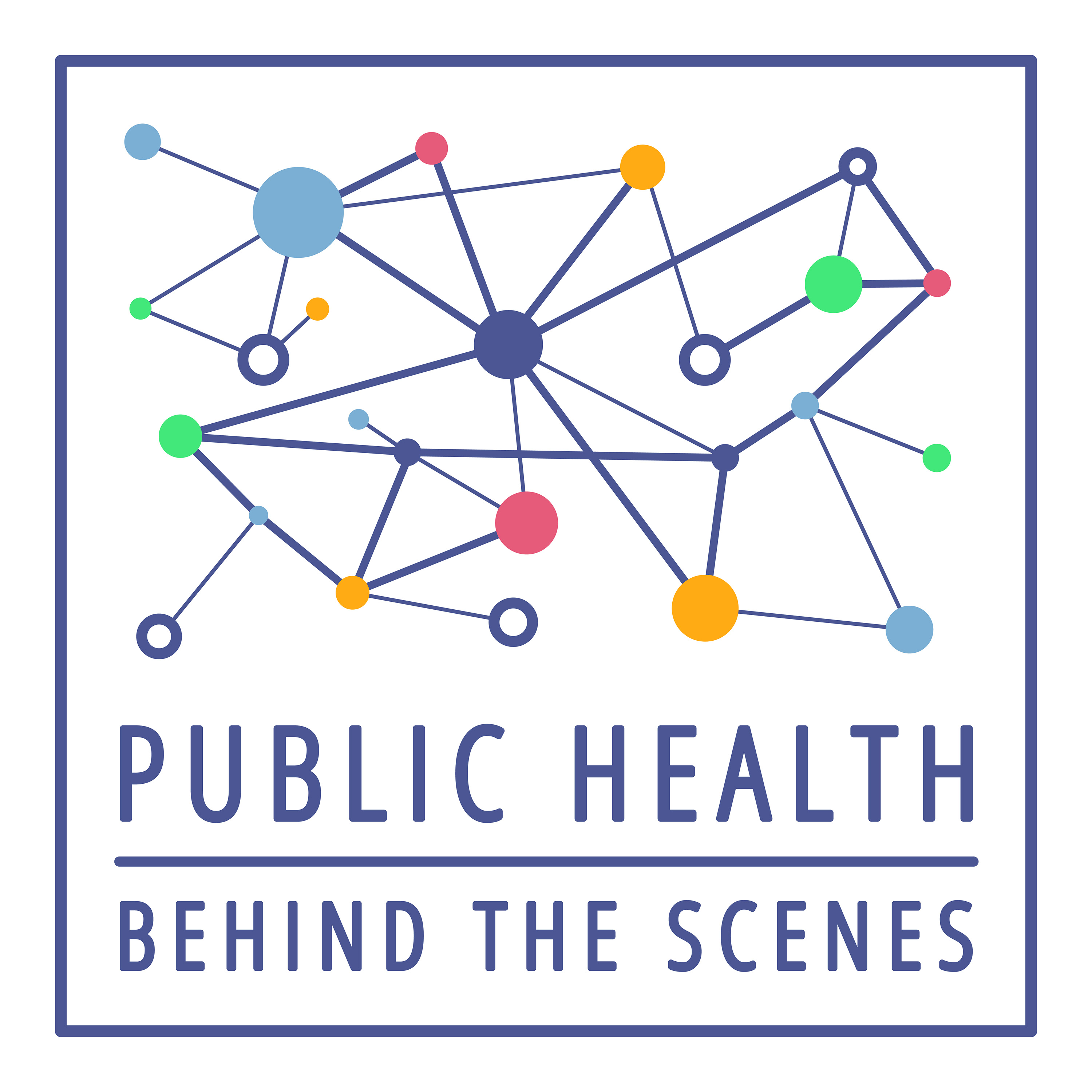In the United States, one in three families struggle to afford diapers. The Diaper Bank of North Carolina was founded on the simple belief that all children deserve clean diapers and through the help of donors, volunteers and connections made with community partners, they are working to do just that.
If you like what you hear, please subscribe on iTunes.
Jessica: Unless you are a parent, grandparent, or caregiver, diapers may not exactly be at the forefront of your mind. But for families in need of them, they can become a major source of stress, guilt, and desperation.
Natalie: In the United States, one in three families struggle to afford diapers. For these families, many resort to buying smaller packages of diapers, multiple times per week, and ultimately paying much more than families who can afford to buy in bulk and only do so once a month or every few months.
Jessica: Public safety net programs such as The Special Supplemental Nutrition Program for Women, Infants, and Children (WIC) and Supplemental Nutrition Assistance Program (SNAP) do not cover diapers, often putting families in the difficult position of choosing between buying diapers and other necessities on very limited incomes. For families in need, something as small as a diaper can have a significant impact …
Michelle Old: For the first year and half he was very sick so he was in the hospital three to five times a month, and a lot of those times he would end up in the ER, on IVs, because of diaper rashes. And we were changing his diaper 15 to 20 times a day, every time he soiled a diaper we changed it, and he would still not be able to fight off basic infections.
So one late night at the hospital, I started thinking about families who can’t easily grab more diapers, I knew there was no assistance for diapers, that WIC and food stamps didn’t cover them, and I also had the great pleasure of meeting his birth mother and I knew she would have really struggled to do what we were doing and he was still very, very sick.
And I became obsessed, a little bit, and I came home and said, “I think I’m going to start a diaper bank.” And he was silent for a while (laughter) and then we looked at our budget to see if I could quit my job to do it and we made room for me to do it, they believed in me, and so here we are! And now, my son is four, and perfectly healthy

Photo: Michelle Old shares her story with Naya of how the diaper bank got started.
Natalie: That’s Michelle Old, founder and executive director of the Diaper Bank of North Carolina. With three young children, this all seemed like a daunting task, but she and her husband Gregory sat down and put together a plan for Michelle to quit her job and focus on ensuring families in need across the state didn’t have to worry about diapers on top of everything else.
Michelle Old: My goal was 50,000 diapers the first year, and I naively thought it would be from my kitchen table, part-time, raising three kids. That first year we did 209,000 diapers; our second year over half-a-million diapers, so it’s grown really fast and it’s not part time from my kitchen table (laughter).
Jessica: And then this happened…
News Clip Audio: This is what’s left after a thief broke into the Diaper Bank of North Carolina in Durham. “They cleared us out of 4s, they took every single 4 we have, and a majority of our 5s [Michelle Old] …” Those are the most sought after for sizes, more than 13,000 diapers stolen. Michelle Old founded the diaper bank to help families in need, every month they distribute about 29,000 diapers to local non-profits, including Welcome Baby, where some families …
Reed Frankel: I guess about a year and a half ago, maybe two years now, they had the robbery at the church, got a lot of press, where 13,000 diapers were stolen, which was their entire inventory at the time. And that was going to put them out of business, at a time I believe it was both Huggies and Pampers offered them a trailer truck full of diapers, but they didn’t have anywhere to store the diapers. So I had heard about this through some friends of mine that are more involved with the city, so I reached out to Michelle to see if we could receive the diapers and help them temporarily, and that turned into this.

Photo: Reed, Michelle, Kelley and Naya talk about how their partnership made expansion of the diaper bank, and ultimately, serving more throughout the community possible.
Jessica: That’s Reed Frankel, board member for the Diaper Bank of North Carolina and very important person in this story.
Michelle Old: In a week’s time, we were generously donated over a 130,000 diapers, from the community, from Pampers, Huggies, Honest, but we had to have a loading dock and we had to have storage quickly …
Reed Frankel: I just sent her an email and said I don’t know exactly what you’re looking for, I just heard that you are in need of warehouse space temporarily, and I don’t know how much you need, or how much space, or if we can help, but we’re here if you want to talk. And she called me a few minutes later and we met and she came and looked at the space and it started from there.
Michelle Old: And so now we’re under one space, we have access to a forklift, pallet jacks, we have access to a card board baler, because I was taking … you can see all the cardboard we can go through. So really his generosity is making this possible for us.

Photo: Michelle, Kelley and Naya tour one of the main storage areas of the bank where they can now (easily) store pallets piled with boxes of diapers.
Reed Frankel: It’s something that never occurred to me, we’re very philanthropic and we know that a lot of people need food and they need money, and diapers never even occurred to me, when you start doing the math, diapers are one of the more expensive things people have to deal with. And so the need is tremendous, so it was a great opportunity for us to get more involved in the community and help out, so it was a pretty compelling story and easy to get involved …
Kelley Massengale: The diaper bank recognizes that families that need diapers need other things too, this isn’t their only need, and so they partner with several agencies locally in Durham and Wake Counties, but in other regions of the state as well, and they provide diapers to those agencies who then provide the diapers to the clients that they serve.
Natalie: That’s Kelley Massengale, a PhD candidate at UNC Greensboro, helping the Diaper Bank with research and evaluation.
Kelley Massengale: And those agencies work with the families to meet other needs they have, some of the agencies are helping kids to get caught up on immunizations, some are providing early childhood education for families, some are providing job training, some are homeless shelters, but they work with families in number of different ways, but those are families with young children that also need diapers, so providing those diapers to the agencies helps impact the agencies budgets.
Jessica: Which in turn has a big impact on the family.
Kelley Massengale: From serving families, a lot of things that they were doing, a lot of families were asking family friends, neighbors for money to buy diapers or asking if they had extra money to buy diapers, and whenever they’re able to receive the diapers from the Diaper Bank it helps them in a social way too, it’s less, fewer times they have to ask other people for diapers. We had other families that were describing that when they don’t have enough diapers their children might be wearing diapers longer than usual, they might be wearing a diaper that is too small or too big, and that definitely affects the stress of the parents and it also makes the children more stressful as well.
Natalie: A lot of people might not understand that when children don’t have enough diapers they often can’t go to daycare, and daycares require a certain number of diapers for children to get through the school day. If parents can’t provide those diapers, they might have to stay home, affecting their ability to work and ultimately their total income.
Jessica. And for families most in need:
Kelley Massengale: So families living in a homeless shelter describe that when they receive diapers from the diaper bank they were able to take their children to daycare, they could take care of their own physical and mental health needs, they could look for a job, go to school, participate in job training, in parenting classes, go to work, and save money for other expenses, either in the short or long term.
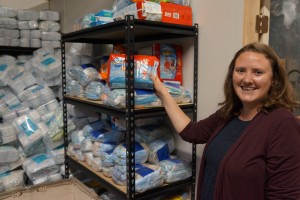
Photo: The Diaper Bank of North Carolina collects various types of diapers, including pullups, swim diapers and adult diapers.
Natalie: On March 10, 2016, the White House wrote on their blog summarizing about the diaper divide, ‘many parents are struggling to afford diapers and making choices no one should have to make.’ The unfortunate reality is this: 1 in 3 families struggle to afford diapers, and even for the other two thirds, they’re a huge expense and a necessity, not something you can easily cut out of your budget.
Jessica: Average estimates vary, but the numbers of diapers needed per day range from 12 diapers a day for newborns, to about six for a toddler. If you buy in bulk you’ll end up paying less per diaper, but that requires having the money and access to a big box store. For example, a box of 120 newborn diapers at Target can cost $17.99 compared to a package of 32 newborn diapers at Walgreens for $12.49. That’s 15 cents compared to 39 cents a diaper (not including tax) and over time, that adds up.
Natalie: Something that might make sense would be considering the use of cloth diapers, right? But the truth is that there is a huge startup cost, you have to have access to a washer and dryer where you’re able to wash the diapers, and a lot of child care centers only allow disposable diapers.
Jessica: To add on to this, diapers are taxed as a luxury item. So for many families in the US, they’re a necessity just like water, food, rent, and transportation. And that’s when things are going well, if you don’t have a job, disposable income, and things get worse, access to something as simple as a diaper can significantly increase the stress on a family.
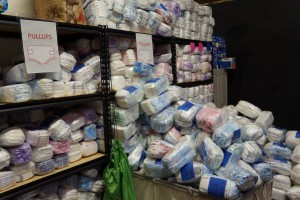
Photo: Bundles of diapers (12 per package) are sorted, packaged and stored at the bank, ready to be distributed to community partners to meet diaper need throughout the community.
Michelle Old: There was a Huggies study that showed that when mothers had 12 more diapers a week they felt less stress and anxiety. So that number resonated with me, and I thought we’ll fill that gap, so we do 50 diapers a month per child. We would like to see some program, it doesn’t have to be a full bank like we are, some program addressing diaper need in every single county in North Carolina. We also want to see diapers to stop being taxed as a luxury item, and feminine hygiene products not being taxed as a luxury item, so we want to work on advocacy to talk about diaper need. We don’t want to see programs like WIC and food stamps expand into diapers, but we want it to have its own separate program, because already WIC and food stamps are not meeting needs, and are supplementing. So if we add in diapers to all that, it’s just not enough. So there’s work to do on that, and right now I want to make sure that we are sustaining what we do and that we grow in a very thoughtful and considerate way.
Debbie Hauck: I met Michelle at the Kidscycle that she runs twice a year, and I had just moved here, looking for some volunteer opportunities so I asked her if she needed help and here I am!
Jessica: That’s Debbie Hauck, diaper distribution coordinator at the warehouse in Durham.
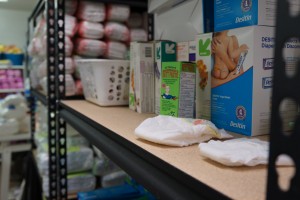
Photo: The Diaper Bank of North Carolina also accepts and distributes diaper wipes, diaper creams, and sanitary products for postpartum mothers.
Debbie Hauck: I do a little bit of a lot of things. i wrap diapers every day because it makes me feel good. I keep track of inventory and volunteers, just helping Michelle any way I can when she needs to be gone, answering phone calls, emails. I’m here on Thursdays when they come to pick up the diapers, and so they come in, we talk a little bit usually and I help them carry the diapers out to the car, have them sign a piece of paper that they picked them up, and on their way they go.
Natalie: Debbie is one of the many important volunteers who make what the Diaper Bank does possible. Repackaging all the donated diapers, wipes and other supplies takes a lot of work, though, and this is only possible because of a continuous flow of volunteers.
Debbie Hauck: Right now we have a group out here, we got a huge bundle of diapers that’s all mixed up with different sizes and they’re going through and sorting by sizes and getting them ready to wrap. Most people just come in and wrap the diapers, but if you come as a group it’s so much more fun. You know, you can talk and laugh and have a good time.
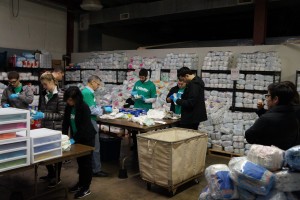
Photo: A volunteer group sorts and wraps diaper bundles for distribution later that week to community partners serving clients experiencing diaper need.
Jessica: And if you can’t make it in to the warehouse to help wrap, there are other things you can do.
Michelle Old: Organize a drive, talk about diaper need, it’s something that’s not even talked about when we talk about poverty issues, diaper need is not even talked about, yet one in three families is experiencing diaper need, so it’s just learning what you can in talking, sharing, supporting the work we’re doing.
Kelley Massengale: People can come to volunteer at the Diaper Bank with groups, and they can come at different hours of the week as a big group, if they want to come with co-workers, or neighbors, or friends, or classmates. And then also individuals can come too, it could be a couple of friends coming together, or sometimes we have moms who come every week with their kids and that’s what they do here, it’s part of their week.
Natalie: Again, it’s these volunteers that make it all possible for Michelle and her team to do this important work. You can learn more about how to get involved and volunteer at the Diaper Bank of North Carolina by visiting their website: ncdiaperbank.org.
Debbie Hauck: You know, I had really never volunteered much before because I thought I was too busy, had a family, and I was working, and I was tired … I love volunteering now that I’ve starting doing it I wish I had been doing it for years, my only advice is to get involved now.
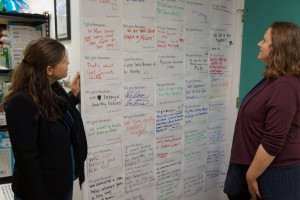
Photo: Michelle and Kelley read some of the notes decorating a wall of the warehouse, collected from volunteers explaining why they give to the Diaper Bank of North Carolina.
Jessica: This episode was produced by Natalie Smith, (me) Jessica Southwell, Naya Villarreal, and Branson Moore. In honor of their incredible commitment to the community, we are proud to announce the Diaper Bank of North Carolina is the UNC Gillings School of Global Public Health 2016 Public Health Champion. We are so proud of their work with community partners across the state to decrease the diaper disparity in North Carolina. Congrats!
Natalie: Links for this episode are available in the show notes at publichealthpodcast.com. We’re also on Facebook now! Our hope is that it will give us one more place to connect and share resources on the topics we discuss. And as always, if you like what you heard, tell a friend and subscribe to us on iTunes. Thanks!


